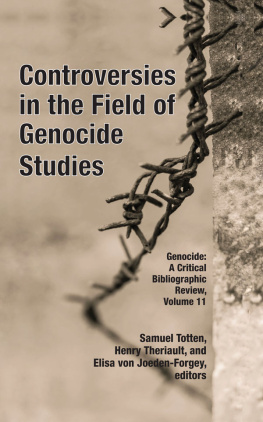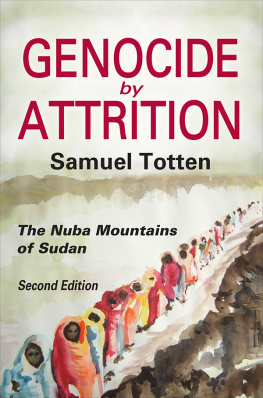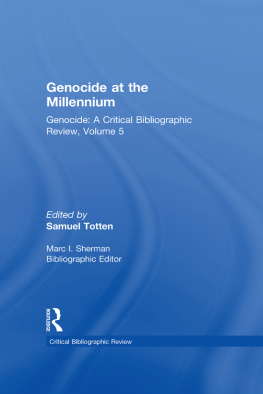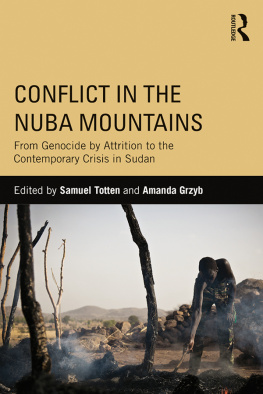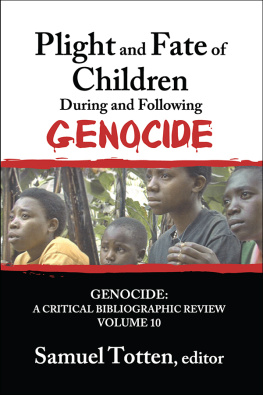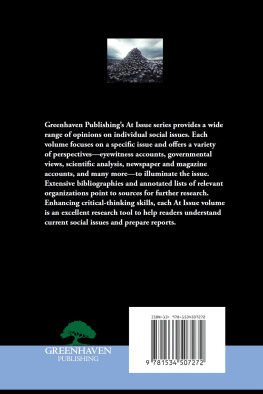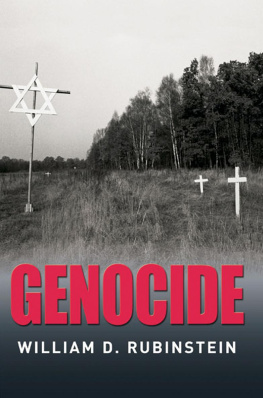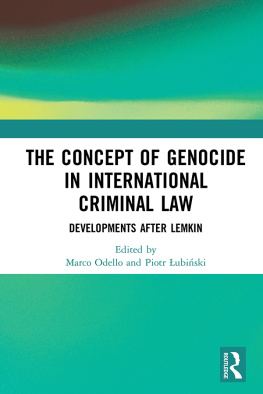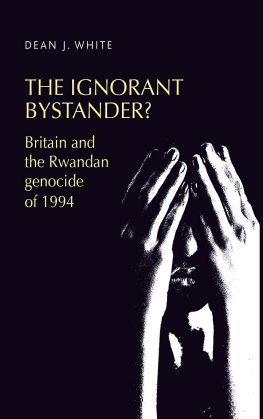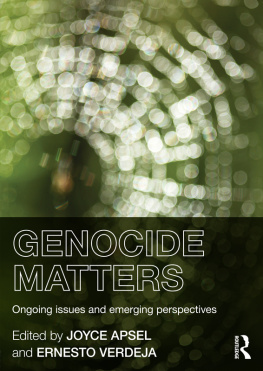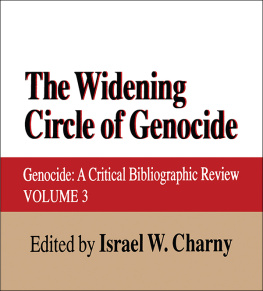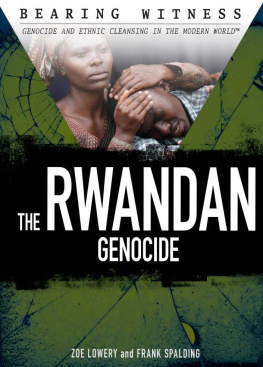Controversies in the Field of Genocide Studies
Genocide: A Critical Bibliographic Review Series
Samuel Totten, editor
Titles in this series include:
Controversies in the Field of Genocide Studies
Plight and Fate of Children During and Following Genocide
Impediments to the Prevention and Intervention of Genocide
Plight and Fate of Women During and Following Genocide
Genocide of Indigenous Peoples
Genocide at the Millennium
Medical and Psychological Effects of
Concentration Camps on Holocaust Survivors
The Widening Circle of Genocide
First published 2017 by Transaction Publishers
Published 2017 by Routledge
2 Park Square, Milton Park, Abingdon, Oxon OX14 4RN
711 Third Avenue, New York, NY 10017, USA
Routledge is an imprint of the Taylor & Francis Group, an informa business
Copyright 2017 by Taylor & Francis
All rights reserved. No part of this book may be reprinted or reproduced or utilised in any form or by any electronic, mechanical, or other means, now known or hereafter invented, including photocopying and recording, or in any information storage or retrieval system, without permission in writing from the publishers.
Notice:
Product or corporate names may be trademarks or registered trademarks, and are used only for identification and explanation without intent to infringe.
ISBN: 978-1-4128-6516-6 (hbk)
Library of Congress Cataloging-in-Publication Data
A catalog record for this book has been requested
Henry Theriault and Elisa von Joeden-Forgey
From its earliest days, vigorous debates have played an important part in the development of the field of genocide studies. From a period in which various alternatives to the United Nations Convention on the Prevention and Punishment of the Crime of Genocide (UNCG) definition of genocide and related typologies of genocide were promulgated to vital and productive disputes about whether mass violence in such places as Cambodia and Bosnia constituted genocide, these disagreements have helped shape the contours and foster the development of the field.
With more recent and new research and insights into genocide has come a new sensitivity to ideological shadings, speculative data interpretation, and other critical reflections.
In light of that, it seems that this is an ideal time to examine a number of current controversies in the field of genocide studies.
Some of the controversies to be examined herein have been with us for a decade or more but are still lively and significant. This is particularly true, for example, of the Ach case, which is examined by Robert Hitchcock, Wayne Babchuk, and Charles Flowerday. Their analysis of the literature offers the insights of experts into this case, highlighting viewpoints on both sides of the debate. What makes their approach so helpful is that they are able to retain a concern about the victims of the relevant violence despite treating the question of whether they suffered genocide or something else altogether. This drives a bold analysis of the literature and the case by the authors, all of whom agree that according to a narrow definition of genocide the Ach did not experience the crime of crimes. In turn, they duly note that the definition of genocide as laid out in the UNCG itself is such that indigenous suffering as experienced by the Ach cannot fit it. Interestingly, the authors propose a way of conceiving genocide that not only applies to the Ach case but does so by reaching more deeply into the complex, long-term, socially embedded forces that result in the destructive reduction of the numbers, material well-being, and/or psychological and cultural health of indigenous peoples. The model of genocide the authors propose not only provides a means to gain new insights into the Ach case, but may also have significant implications for analyses of whether or not other indigenous peoples the world over suffered genocide. This chapter and the concept of genocide it develops are destined to become must-reads in the field of genocide studies.
Amanda Grzyb and Amy Freier address a controversy that involves active propaganda and its relationship to debates on free speech: the controversy surrounding Radio Tlvision Libre des Mille Collines (RTLM) and the refusal by the international community, and especially the United States, to jam its broadcast signals which spewed propaganda and hate-filled messages as well as called Hutu killers to work during the 1994 genocide in Rwanda. Until relatively recently, it was assumed by most scholars that jamming RTLM would have hindered significantly the genocidal process in Rwanda because of the way that the station was used by perpetrators directly to incite violence in specific places. Silencing the broadcasts, proponents argue, would have reduced the level of hate propaganda to which people were exposed on a daily basis, and deprived gnocidaires of an important tool to rally its killers. However, the results of a new research question about just how central media effects were in the perpetration of genocide, thus arguing for a more nuanced understanding of the role of RTLM. Court decisions about this controversyand particularly the International Criminal Tribunal for Rwandas 2003 judgment in the Media Casewill likely have far-reaching implications for the way that the international community views genocide prevention and for how we think about the tension between protecting free speech and the need to address incitement.
Propaganda assaults truth from the time it is instrumentalized for the purposes of committing genocide and continues for generations after the peace. Denialist aims and arguments are structured by and often deliberately draw from the arguments and frameworks laid out in genocidal propaganda. Broad-based transitional justice efforts to reestablish agreed-upon truths are therefore critical to any long-term prevention of violence. Cyanne Loyle examines an innovative, and controversial, case of transitional justice: Rwandas homegrown and village-based gacaca courts. Loyle shows that, despite its successes in processing the vast backlog of cases after the genocide in 1994, in building a public record of the crime, and in fostering community engagement, the process has been criticized from the start for due process irregularities and accusations that it was illegitimately one-sided in its refusal to examine abuses and crimes committed by the Rwandan Patriotic Front during the civil war. Ultimately what is at stake is whether Rwanda has been through a transitional justice process that has truly fostered social healing or whether gacaca has increased ethnic tensions and divides, thus contributing to the vulnerability of Rwandan society to genocidal violence in the future.
It is important to point out that the controversies treated in this volume are not manufactured or denialist. Such debates juxtapose legitimate scholarship with work based on poor methodologies deployed in an effort to deny the veracity of a genocide finding clearly supported by facts. This volumes contents distinguish clearly between legitimate debates and denialist constructs. Regarding the latter, they reflect the principle that denialist-generated controversies should be treated as the objects of research, not genuine areas of debate. The issue of manufactured controversy is at the heart of Panayiotis Diamadis extensive treatment of recent denialist activities regarding the genocide of Greeks, Assyrians, and Armenians in the Ottoman Empire starting in 1914. Diamadis focuses much of his chapter on efforts to gain governmental recognition of such genocides and to memorialize them. This approach offers special insight into the complex ways that not only geopolitics but the history of national identity formation can lead to pressure toward denialas well as how such pressure can be and has been resisted. Diamadis addresses the fact that Australia has a special connection with Turkey and 1915 for, along with New Zealanders, its soldiers suffered great loss at Gallipoli. Had they succeeded in that military operation, it is quite possible that the genocide of Greeks, Assyrians, and Armenians could have been stopped in its early stages and a very different Turkey would have emerged from defeat in World War I. Furthermore, the sacrifices of soldiers at Gallipoli drove broad commitment to the notion of Australian nationality in the aftermath of Australias gain of independence. Somewhat paradoxically, the defeat at Gallipoli is the foundation of the strong contemporary relations of Australia with Turkey. Diamadis expertly lays out the issues at stake when activism by Greeks, Assyrians, and Armenians intervenes to problematize this relationship and compels a much more detailed and responsible examination of the full activities of the Ottoman government that goes beyond the fabled battle.

